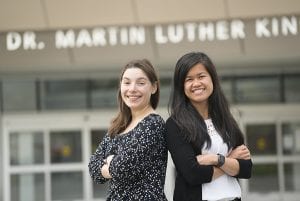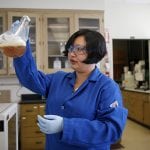
Librarians Yen Tran and Kate Barron offer support services for faculty and student research, scholarship and creative activities in a variety of ways. Photo by Brandon Chew
By David Goll
Student and faculty researchers have a new ally in their scholarly pursuit — two new University Library positions have been filled in the past year to gauge the impact of faculty research, scholarship and creative activities and to help researchers plan for collection and storage of data.
Yen Tran, a veteran librarian who arrived at SJSU in August 2016 and has previously worked at the University of Oregon, University of California, Santa Barbara and California Lutheran University, became the university’s first research impact librarian in January 2018. Kate Barron, who earned master’s and bachelor’s degrees from the University of Michigan and Rutgers University, respectively, became SJSU’s data services librarian in October 2017.
“The university has supported faculty in their research, scholarship and creative activities (RSCA) through a variety of methods in recent years, including university and college grants,” Tran said, noting that administrators were interested in a position that would support research management practices.
Tran said academic librarians are most appropriate to fill the research impact role, having a long history of tracking faculty scholarship. She described her main job duties as supporting faculty in understanding and demonstrating their research impact and compiling faculty RSCA output to identify trends. In the future, she may also be able to help with tracking funding and funding sources and support collaboration with other institutions.
Barron’s role was created to help researchers manage the evolving needs of data collection and storage. She said she wants faculty researchers university-wide to know she can help them save time and effort by finding information pertinent to their projects already compiled by academics elsewhere. She will also seek data and statistics for researchers, faculty and students alike.
“I want to get the word out about my services to academic departments across the campus,” Barron said, adding she already serves as a liaison between the library and the math, statistics and computer science departments. “I want to make sure faculty and students know our services are not limited to the sciences and engineering. We are also here for the social sciences, health and human sciences, education and the arts and humanities.”
Emily Chan, the University Library’s interim associate dean for research and scholarship, sees both roles as important as SJSU works to create a culture and environment conducive to teacher-scholars.
“Data is the new oil,” Chan said. “Today’s researchers and scholars are generating lots of data and we have the capability of storing that data. It can be reused.”
She sees immediate benefits of Tran’s work in helping researchers quantify the impact of their projects and creative activity, including tracking social media reactions.
“She will look at both the quantitative and qualitative,” Chan said. “This is invaluable in helping researchers identify and improve the impact of their work. And raising our research profile and reputation is very helpful in gaining recognition from donors and funders.”
Barron’s work will have long-term benefits as well in preserving data for years to come.
“We want access to data to be continuous and easily accessible,” Chan said. “We need to consider how we preserve valuable information and provide access to it. That includes for future generations of students and researchers.”
Tracking the RSCA output may also help in communicating about the stellar work completed at SJSU.
Tran hopes to help departments and colleges compare their output with other institutions.
“Most importantly, I think that a database of faculty RSCA where the information could be put on university, college or departmental web pages could facilitate greater visibility of faculty RSCA, which could help them find collaborators, student researchers or additional funds for their RSCA,” Tran said.
Interested faculty members or students can reach Tran at yen.tran@sjsu.edu, and Barron at kate.barron@sjsu.edu.

